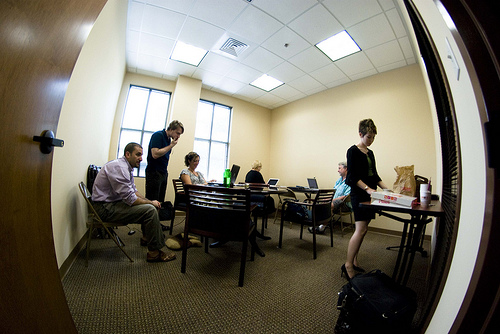UPDATE: We've summarized much of the series this article is part of in a new report, Policies for Shareable Cities: A Sharing Economy Policy Primer for Urban Leaders. Get your free copy here today.
Shared workspaces and workshops like The Hub, pariSOMA, TechShop, and 3rd Ward enrich a city by giving workers, entrepreneurs, and creative people access to space and equipment for their special projects or day-to-day work. These spaces are ultimate breeding grounds for sharing and collaboration. By virtue of sharing space, the entrepreneurs in shared workspaces inevitably come together to share ideas and collaborate on projects. Shared commercial kitchens, like La Cocina, are also incredibly valuable in fostering local food production.

A coworking space in Würzburg, Bavaria. Photo credit: Christian Pier. Used under Creative Commons license.
This year, we’ve seen Mutual Aid in Motion.
From scaling sharing hubs to Mutual Aid 101 trainings, we’re helping communities build the tools they need.
Every dollar fuels lasting resilience – proving that when we move together, we all move forward.
Cities can stimulate the local economy and small-scale enterprise by facilitating the growth of shared offices, workshops, studios, and commercial kitchens. Here are a few suggestions for ways that cities can adopt policies to promote such spaces:
-
Zoning for coworking: Cities can facilitate the growth of coworking and shared offices spaces by making the permitting process streamlined and inexpensive for coworking, and by making coworking a permitted use in most commercial and industrial zones of a city. In commercial districts, where office uses are sometimes not allowed on the ground floor of a building, cities should loosen the rules to allow for coworking spaces. After all, coworking spaces are something of a cross between offices and community centers.
-
Residential coworking: Working from home lowers the traffic and parking burdens in a city. At the same time, many people that work at home feel isolated. Imagine that, instead of going to work in your home office, you gather with a few neighbors to work in one neighbor’s home office. Cities can enable the sharing of home offices by altering rules related to home occupations. For example, cities could allow non-residents to work in a home office, rather than mandating that only the resident of the home can work there. Cities can also enable residential shared workspaces by expanding zoning for mixed-used and live/work spaces.
-
City-owned or city-subsidized shared workspaces: A great way for cities to facilitate the growth of shared workspaces is to build or subsidize them. For example, cities could build shared workshop spaces in conjunction with city tool-lending libraries, or build shared office spaces in conjunction with a public library. Shared workspaces are also a perfect space for educational programming and workshops; a city can subsidize such spaces by providing funding for the educational programs within such spaces.
How else might a city encourage shareable workspaces and workshops? Please post your thoughts below and help us build this collection of policy proposals. Thank you!
This post is one of 15 parts of our Policies for a Shareable City series with the Sustainable Economies Law Center:
- Car Sharing and Parking Sharing
- Ride Sharing
- Bike Sharing
- Shareable Commercial Spaces
- Shareable Housing
- Homes as Sharing Hubs
- Shareable Neighborhoods
- Shareable Workspaces
- Recreational and Green Spaces
- Shareable Rooftops
- Urban Agriculture
- Food Sharing
- Public Libraries
- The Shareable City Employee
- How to Rebuild the City as a Platform

